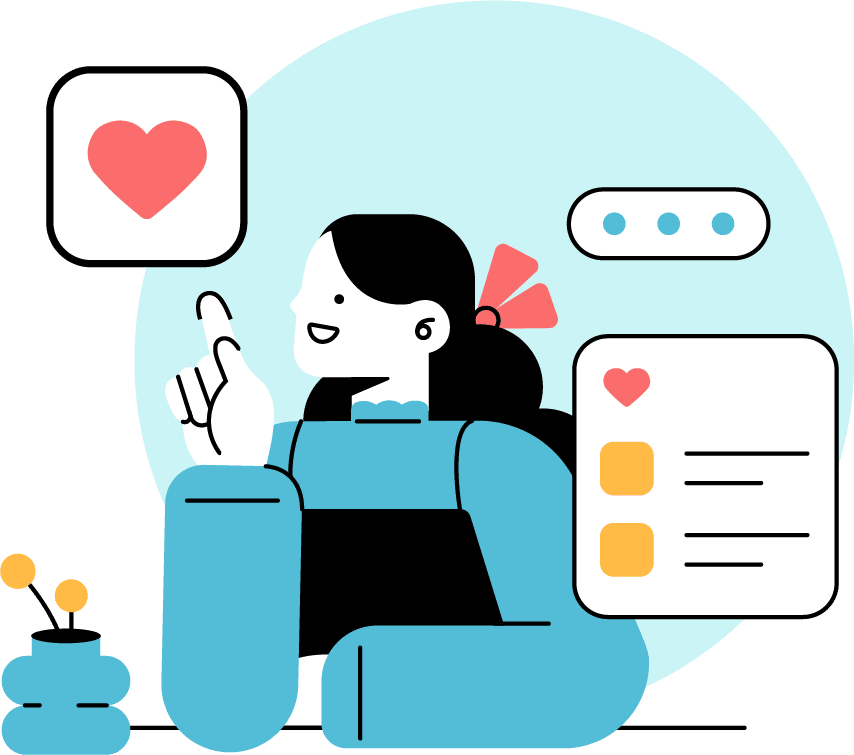More than half of people with mental illness do not seek treatment for their conditions out of fear of what may happen to them personally, professionally, and socially if they reach out for help.
Mental health stigma has a lot to do with the reluctance to seek treatment or professional help. A stigma is when someone views you in a negative way because of a circumstance or characteristic you have that is conceived as a disadvantage or negative.
Stigmas are dangerous, particularly in regard to mental health, because they instill fear and skepticism in those who have a mental health disorder. Stigmas can dissuade people from getting help out of fear of being judged or mislabeled as sick or incompetent.
Stigma and judgment almost always come from a lack of understanding or ignorance surrounding mental health. In this article, we’ll share the implications of the stigma surrounding mental health, seeking treatment, and how it can be combatted through open conversations, language modification, and normalizing care.
What are the Three Types of Stigma?
Stigma affects those with mental illness in three key ways; self-stigma, public stigma, and institutional stigma. Let’s discuss how these types of stigma play a role in mental health and the reluctance to seek treatment.
1. Self-stigma
Self-stigma refers to the negative attitudes and internalized shame that people with mental illness have. Self-stigma can affect your self-esteem and self-efficacy, which can impact your self-worth and hope for the future.
When it comes to seeking treatment, the negative thoughts that stem from self-stigma often include acknowledging that they have a problem but brushing it under the rug out of the fear of being judged or made fun of for seeing a therapist.
2. Public stigma
This refers to discrimination and devaluation of people with mental illness or behavioral health conditions made by other people. Public stigma can affect jobs or career success, access to housing, and even the quality of healthcare they receive.
To the public, the negative stereotypes of seeking mental health treatment can include not qualifying for a promotion at work or not qualifying for a rental application, among many others.
3. Systemic or institutional stigma
Systemic stigma affects larger groups of people with mental illness through public stigmas and negative stereotypes. Systemic stigmas often show in the form of access to care and resources from state or federal policies in health care.
The Harmful Effects of Stigma
The implications of mental health stigma have harmful effects on virtually every part of a person’s life, especially if it prevents them from seeking treatment. Here are a few of the harmful effects stigma may have on people with mental illnesses:
- Reluctance to seek treatment out of fear of being judged
- Mental health conditions worsen due to the lack of treatment
- Failed relationships due to a lack of understanding or empathy
- A lack of understanding from family members and community
- Social withdrawal and fewer opportunities at work or school
- Self-doubt and insecurities about strengths, abilities, and finding success
People with mental health disorders are the ones most impacted by negative attitudes and judgments of their peers, communities, and employers.
How We Can Reduce Stigma
Reducing the stigma around mental health is imperative in order for more people with mental illness to feel comfortable seeking counseling or treatment. Anti-stigma efforts also have a powerful impact when it comes to improving mental health care treatment options for those with mental illness and reducing the fear of asking for help. Here’s how you can reduce the stigma around seeking treatment:
1. Talk openly about mental illness
Speaking openly and honestly about mental illness and how it affects people all around the world is a crucial way to reduce stigma. Sharing the facts and your experiences with mental health allows others to learn, ask questions, and change the misconceptions about mental illness.
Talking openly and asking questions can encourage those struggling to share what they are facing. The judgment and fear that people with mental health disorders experience can shame them into silence. In reality, we should learn from their struggles and encourage them that they aren’t alone.
2. Normalize mental health treatment
This happens when more conversations are had about the fact that mental health disorders are treatable and manageable through treatment. In the same way that you see a doctor when you’re physically sick or something feels off in your body, seeking counseling or professional help when you are facing mental health challenges should be normal and encouraged.
Mental health is a part of our overall health and must be spoken about in the same tone. If you aren’t ashamed about seeing a general care practitioner, then you shouldn’t be ashamed about seeing a therapist either.
3. Encourage equality between physical and mental illness
Comparing mental health care to physical health care is a powerful way to bring equality to physical and mental illness. When seeking treatment for depression or anxiety, individuals may be fearful of looking weak or incompetent to their peers, employer, and community.
However, if this mental health condition was a physical ailment, like kidney stones or heart disease, wouldn’t an employer or family member encourage this person to seek treatment and get better?
Comparing a mental health condition to a physical illness is a powerful way to change negative attitudes about mental health care because it emphasizes the disease over the person affected.
4. Share recovery journey and personal stories
Mental illness does not discriminate, so it’s important to raise public awareness of the fact that many seemingly healthy or “normal” people are seeking professional mental health care. For young adults, treatment can mean missing school or social activities and the fear of their friends knowing they have a mental illness.
Sharing stories of recovery is a positive way to showcase treatment. Certain challenges that an individual overcame to acknowledge a mental health problem, ask for help, and receive treatment to improve their quality of life is brave and noteworthy.
Language Modifications that Support Mental Illness & Treatment
Language, phrases, and words matter when it comes to speaking about mental illness and the people it affects. There are many common terms that have a negative connotation toward people with mental illness; these include “addict,” “junkie,” and “user,” which imply that people with substance use disorders are able to stop; they just choose not to.
Reframing the terms you use when speaking about mental health care has a powerful impact on the stigmatized groups of people with mental illness. Rather than saying, “he is mentally ill,” we encourage the use of first-person language to emphasize that the person has a problem rather than being the problem — instead, you could say “he has a mental illness” or “he lives with a mental illness.”
The language and wording you use when talking about mental health can help to reduce the stigma surrounding mental health conditions and treatment. The perception of mental illness is defined and described by the words we use and the ones we don’t.
Why Ending the Mental Health Stigma Matters
Simply put — it will save lives. The average delay between the onset of symptoms and intervention is between 8 and 10 years. The mental health stigma can create significant challenges to asking for help, getting support, and living a happy, fulfilled life. Less than half of the adults in the US get the treatment they need, even though mental illness is highly treatable.
Doctors treat physically sick patients every day and save their lives – those with mental health disorders should receive the same support, treatment, and acceptance.
Get the Care You Deserve with Clear Behavioral Health’s Virtual Program.
Clear Behavioral Health Telehealth is a fully online, mental health intensive outpatient program. Our team is skilled at treating individuals who are struggling with mental health disorders including burnout, depression, anxiety, trauma, and grief.
Whether you struggle to function in social settings or you’d prefer treatment within the privacy of your own home, our Virtual IOP offers remote access and the same quality of care. Learn more here.





